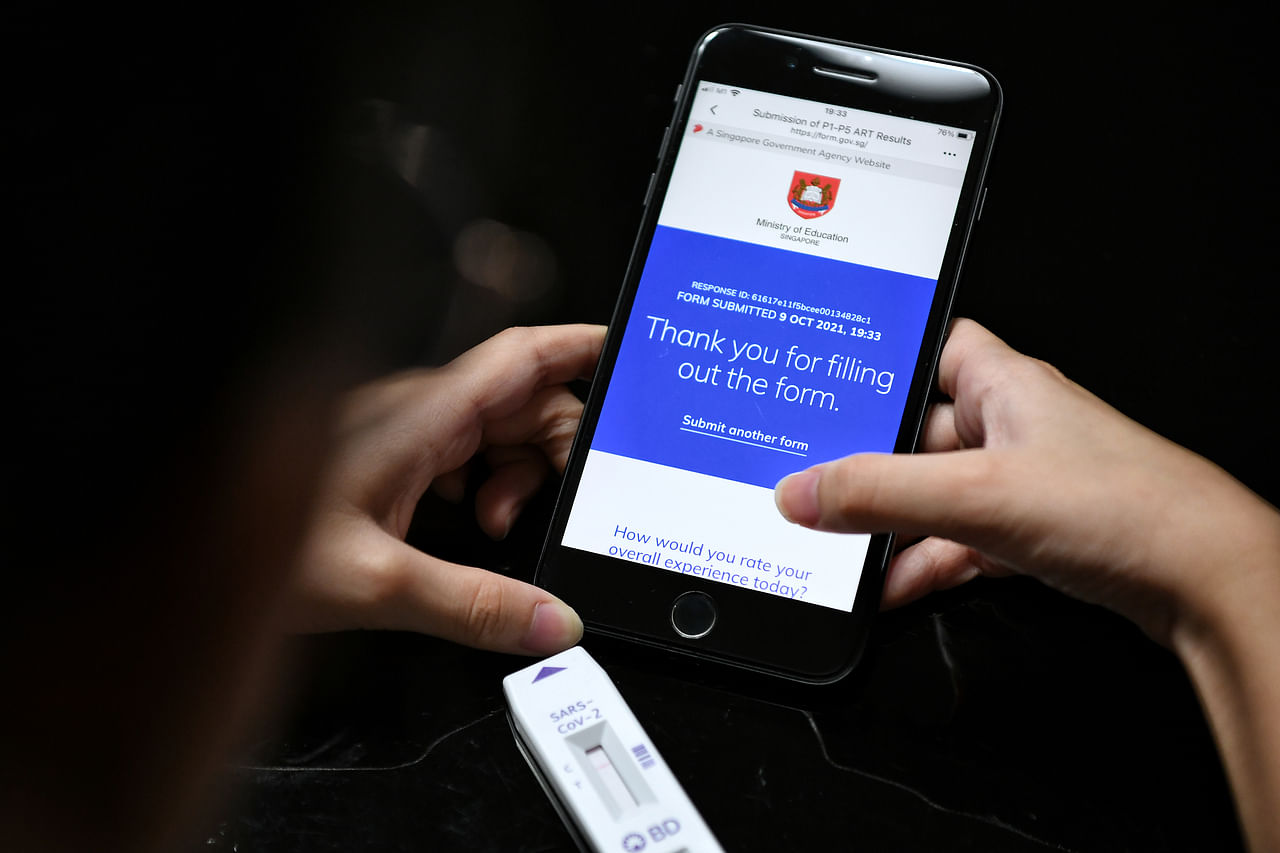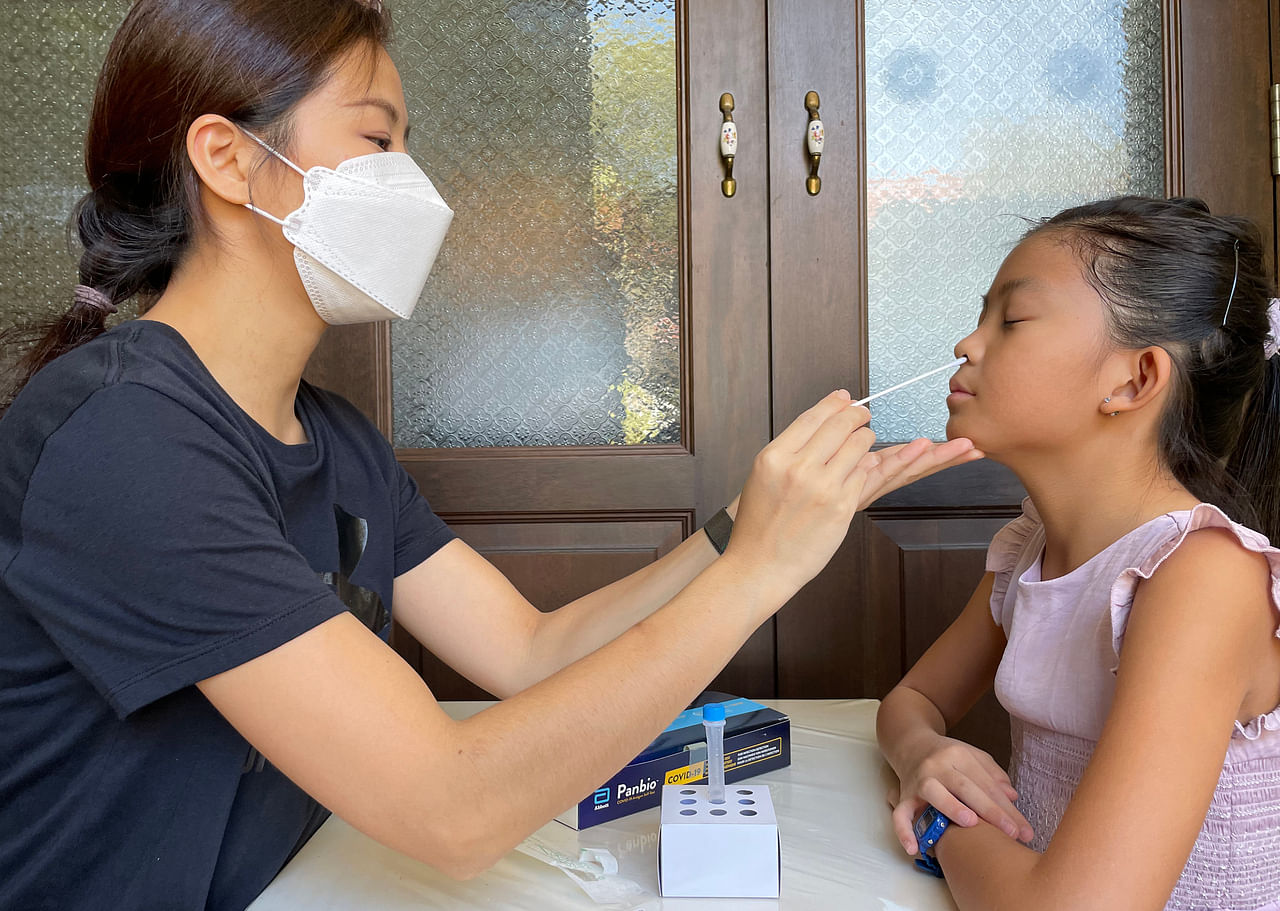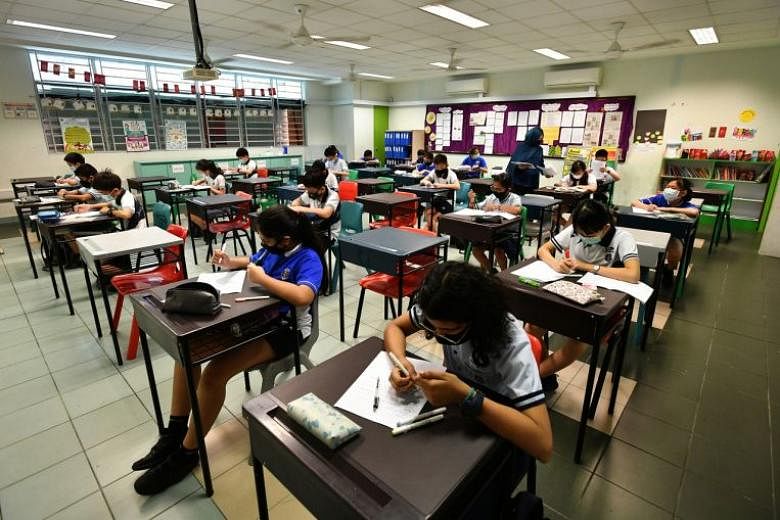SINGAPORE - Primary school pupils will need to take an antigen rapid test (ART) every two weeks until school closes for the holidays in November, said the Ministry of Education (MOE).
In a letter addressed to parents and guardians on digital portal Parents Gateway on Wednesday (Oct 20), MOE said 10 ART kits will be distributed to each pupil from next Monday.
That means parents will not need to buy more ART kits for their children.
Regular testing will help inculcate social responsibility among pupils and keep schools safe for learning, said MOE.
The new testing regime will require pupils to perform one ART swab at stipulated times.
The first test must be taken by Oct 31 and the second must be taken by Nov 14.
Parents and guardians will need to supervise children when they take the ART, MOE said.
Once a result is obtained, parents can submit it at a link provided by their child's school.
If it is positive, pupils must inform the school through the form teacher immediately, said MOE.
Pupils who test positive for Covid-19 and are unwell will be sent to a Swab and Send Home Public Health Preparedness Clinic for a polymerase chain reaction (PCR) test.
Meanwhile, those who get a positive ART result but feel well are required to self-isolate for 72 hours before taking another ART.
They can end their isolation when the result is negative, MOE added.
Responding to queries from The Straits Times, MOE said the rules on testing and distributions of ART kits will also apply to the primary or junior sections of special education schools.

The Government has been encouraging more people to test themselves regularly with ART kits.
At a briefing in September by the multi-ministry task force tackling Covid-19, Trade and Industry Minister Gan Kim Yong said testing remains key to detecting infections early and minimising the risk of further transmissions.
He urged people in Singapore "to make testing a way of life and self-test before visiting crowded places or visiting those who are more vulnerable, such as the elderly or children".
Now, staff who work in settings with unmasked clients, and are in prolonged and close contact with clients when performing services have to take regular tests regardless of their vaccination status.
Those who are involved in frequent community interactions also have to do the same. They include people working in retail supermarkets, food delivery personnel and public transport workers.
The new rules for children come at a time when Covid-19 case numbers in the community have remained high, with 3,480 infections reported on Tuesday.
Of these, 201 were children aged 11 and below. Those in this age group are currently not yet eligible for the Covid-19 vaccine.

Since the start of the pandemic, a raft of measures have been rolled out at primary schools.
These include extended periods of home-based learning, the suspension of co-curricular activities and fixed exam-style seating in classrooms.
Since Oct 13, all primary school pupils have resumed in-person classes.
However, pupils did not need to report to school this week because of the PSLE marking exercise, which usually takes place over four days.
MOE had extended the marking exercise until Friday, in what it called an "exceptional year".
Pupils will return to school from next Monday.
Some parents, however, questioned the usefulness of taking an ART.
A civil servant who has a son in Primary 4 and who wanted to be known only as Shah B, 41, said: "Elsewhere, ART results are valid for up to 24 hours only, so what's the rationale behind primary school students being tested every two weeks?
"A better way is to either continue home-based-learning until the end of the term or just bring forward the holidays."
In response to queries, Professor Paul Tambyah, a senior consultant at the National University Hospital's Division of Infectious Diseases, said the effectiveness of rules in encouraging pupils to be socially responsible will depend on how testing is done.
He said: "Although ART tests are a lot less onerous than nasopharyngeal swabs for PCR, they can also be uncomfortable for children with nasal allergies. There is also the risk that children will go to school while symptomatic, if they have recently had a negative ART test, given the false negative rate.
"Social responsibility has more to do with protecting others and looking out for your friends."
Prof Tambyah, who is also a professor of medicine at the National University of Singapore's Yong Loo Lin School of Medicine, said while there is a study from Britain which suggests that regular testing might be better to curb Covid-19 infections than quarantining large numbers of children, both approaches are premised on eliminating the virus rather than living with it.
"Under a strategy which involves living with the virus, we would make sure that symptomatic children stay home and are tested... for all respiratory pathogens and not just Covid-19 while doing surveillance to monitor for trends," he said.
Prof Tambyah added that ART tests are relatively simple so the risk of parents administering the tests incorrectly is marginal. "The problem is with false positives, which can cause a lot of anxiety and disruption", he said.
On Wednesday, Finance Minister Lawrence Wong said at a press conference that regular testing of pupils is meant as an additional layer of protection to minimise the spread of Covid-19 infections in school and the emergence of large clusters there.
"These are ways in which we can continue to as much as possible carry out normal activities but ensure that these are done safely," said Mr Wong, who is also co-chairman of the multi-ministry task force tackling Covid-19.
- Additional reporting by Ng Wei Kai


